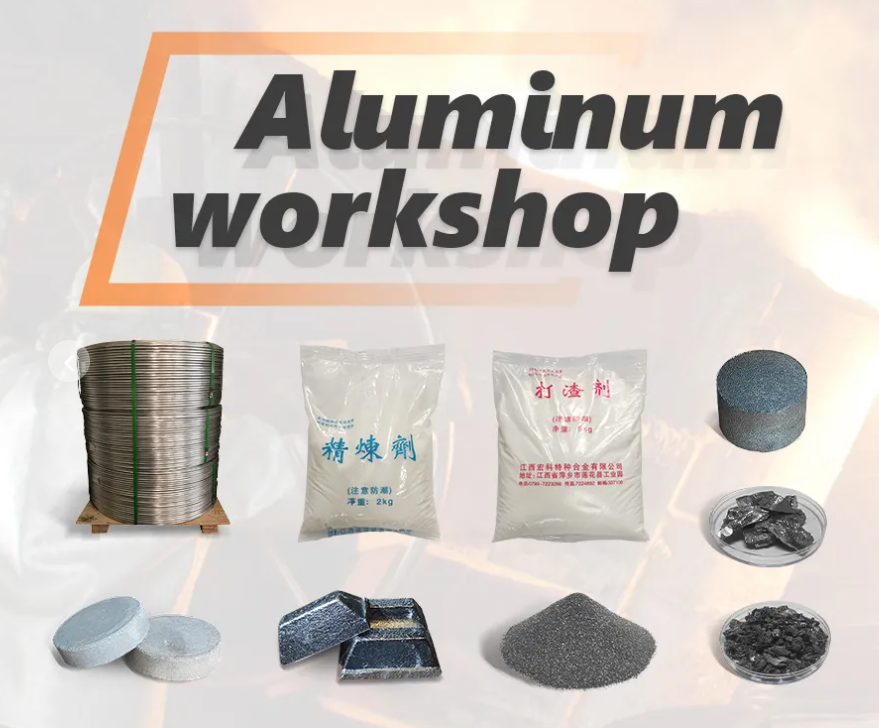Aluminium casting flux is a critical component in the process of casting aluminum. Whether you're a seasoned professional or new to the world of aluminum casting, you likely have questions about this essential material. In this article, we'll address ten frequently asked questions related to aluminium casting flux, providing you with a comprehensive understanding of its use and importance.

1. What is Aluminium Casting Flux?
Aluminium casting flux is a chemical compound used in the casting of aluminum. It serves several purposes, including removing impurities from the molten metal, improving the casting surface finish, and preventing oxidation during the casting process.
Aluminium casting flux works by forming a layer on the surface of the molten aluminum, which captures and removes impurities and non-metallic inclusions. This leads to higher-quality castings with improved mechanical properties.
2. Why is Flux Important in Aluminium Casting?
Flux is crucial in aluminium casting because it ensures the quality and integrity of the final product. Without proper fluxing, impurities like oxides and dross can become trapped in the casting, leading to defects and reduced mechanical properties. Flux also helps to prevent the aluminum from oxidizing when exposed to air during the casting process.
3. How Do You Use Aluminium Casting Flux?
To use aluminium casting flux, it's typically added to the crucible or furnace where the aluminum is melted. The flux should be added in the right proportion based on the manufacturer's recommendations. As the flux melts and reacts with impurities, it forms slag, which can be easily removed from the surface of the molten metal.
4. What Types of Flux are Available?
There are various types of aluminium casting flux available, each designed for specific applications. Common types include cover flux, drossing flux, and cleaning flux. The choice of flux depends on the quality requirements and the specific casting process being employed.
5. Can I Reuse Flux?
In many cases, flux can be reused. After it has been used to remove impurities and dross from the molten aluminum, the slag can be skimmed off, and the remaining flux can be reclaimed and reused. However, the effectiveness of reused flux may diminish over time, so it's essential to monitor its performance.
6. How Does Flux Affect Casting Quality?
The quality of the casting is significantly influenced by the flux used. Properly chosen and applied flux ensures a clean surface, minimal defects, and superior mechanical properties in the final product. Insufficient or improperly applied flux can lead to casting defects and reduced quality.
7. Is Flux Toxic or Harmful?
Aluminium casting flux is typically not considered toxic or harmful when handled correctly. However, it's essential to follow safety guidelines and wear appropriate protective gear, such as gloves and safety glasses, when working with flux. Some flux types may release fumes when heated, so adequate ventilation is also crucial.
8. Where Can I Purchase Aluminium Casting Flux?
You can purchase aluminium casting flux from various suppliers, including industrial suppliers, foundry equipment manufacturers, and online marketplaces. It's essential to choose a reputable supplier and ensure that the flux you purchase meets the specific requirements of your casting process.
9. Can Flux Improve Energy Efficiency?
Yes, the use of aluminium casting flux can improve energy efficiency in the casting process. By preventing the formation of oxides and reducing impurities, less energy is required to produce high-quality castings. This can lead to cost savings and reduced environmental impact.
10. What Safety Measures Should I Take with Flux?
When working with aluminium casting flux, safety is paramount. Always follow the safety guidelines provided by the manufacturer. Use personal protective equipment, ensure proper ventilation, and be cautious when handling hot molten metal. Proper training and awareness of safety measures are essential for all individuals involved in the casting process.
Conclusion
Aluminium casting flux plays a vital role in ensuring the quality and integrity of aluminum castings. Understanding its use, types, and safety considerations is crucial for anyone involved in the casting industry. By following best practices and using the right flux for your specific needs, you can achieve high-quality castings while maintaining safety and efficiency in the casting process.





Comments
All Comments ( 0 )